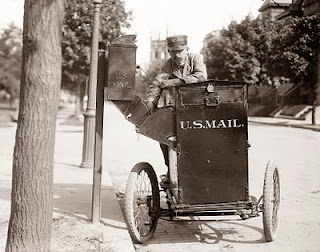Welcome to the fourth column of this week of busting postal myths. We are echoing the points made in PMG Jack Potter’s Washington Post
editorial earlier this month.
Monday, we talked about the “taxpayer supported” myth.
Tuesday, we busted the “inefficient” label.
Wednesday, we discussed the “reliability” rap.
Today, we’ll address Myth #4: “
The Postal Service is not environmentally friendly.”
No doubt about it, delivering mail uses fossil fuels, and mail often produces paper waste. Still, the Postal Service is greener than you think. As long as consumers and businesses use physical mail, we're committed to finding ways to process it responsibly.
Our fleet of 44,000 alternative-fuel-capable vehicles is one of the largest in the world and includes electric, three-wheeled electric, hybrid electric, ethanol, fuel-cell, biodiesel and propane technology. More than a half-billion packages and envelopes that we provide free annually are recyclable and made of environmentally friendly materials.
Last year, we recycled more than 200,000 tons of paper, plastics and other waste -- the equivalent of saving 1.67 million barrels of oil. There are Leadership in Energy and Environmental Design (LEED)-certified post offices, a 2.5-acre green roof on a major facility in downtown Manhattan, solar photovoltaic building systems and other sustainable building designs in use across the country.
Still, saving the environment doesn't begin and end with the Postal Service. That's why we encourage our customers to "read, respond and recycle." In 8,000 post offices nationwide, signs remind P.O. box customers to open their mail, take whatever action is necessary and place the waste in our recycling bins. The EPA reports that standard mail represents less than 2.1 percent of the material in our nation's landfills. (By comparison, disposable diapers represent 2.2 percent, glass beer and soft-drink bottles 3 percent, and yard trimmings 6.9 percent.)
What do you think about this myth?
Comment here.Tomorrow's myth: "The Postal Service can't compete."








